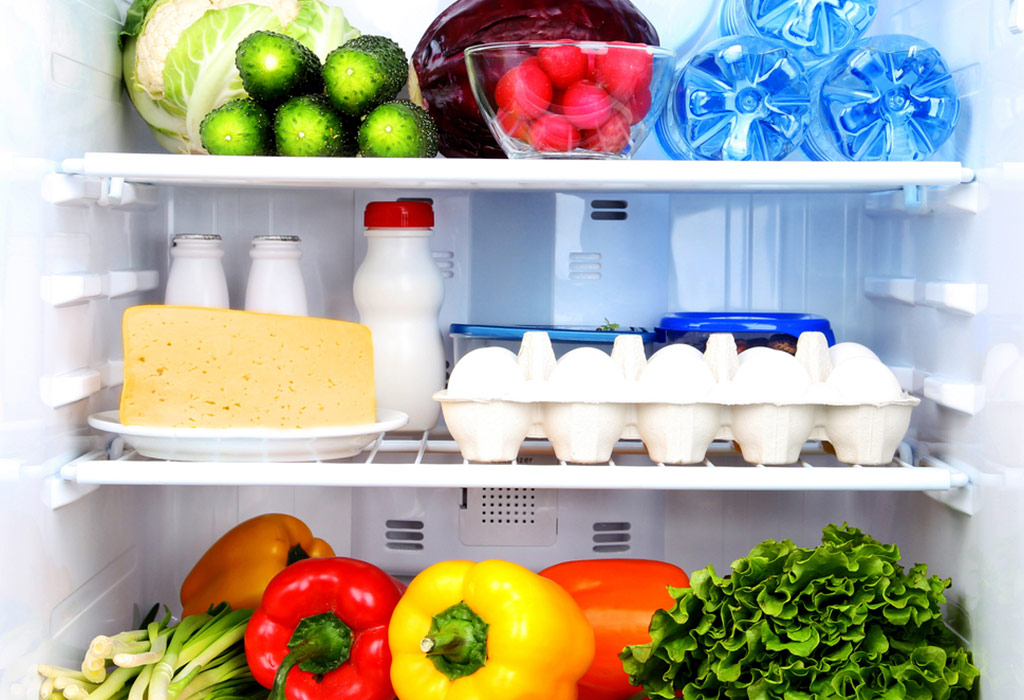In this Article
Sometimes referred to as super food and considered by many to be the best source of proteins, eggs are something that parents of newborn babies have always been sceptical about introducing to the baby’s diet. Read on for detailed information about including eggs in your baby’s diet.
When Can Babies Eat Eggs?
Recent studies have shown that egg yolk can be safely included in the diet of babies as young as eight months of age although egg white should only be introduced after twelve months, read on to learn more about introducing eggs in a baby’s diet.
Nutritional Value of Eggs
Not only is egg a prime source of the best quality proteins after human milk, but a single egg also contains thirteen very essential vitamins. Egg contains essential minerals like copper, zinc, selenium, calcium and iron it also has proteins, cholesterol, fat, fatty acids, and vitamins D, B12, E, choline and folate, all of the above nutrients are essential for the growth and well being of children
NUTRITION FACTS
Serving Size 1 Egg (50 g)
| Calories | 70 |
| Total Fat | 5g / 6% |
| Saturated Fat | 1.5g / 8% |
| Trans Fat | 0g |
| Cholesterol | 185mg / 62% |
| Sodium | 70mg / 3% |
| Total Carbohydrate | 0mg / 0% |
| Dietary Fibre | 0g |
| Total Sugars | 0g |
| Protein | 6g / 12% |
| Vitamin D | 1mcg / 6% |
| Calcium | 28mg / 2% |
| Iron | 1mg / 6% |
| Potassium | 69mg / 2% |
Comparing Egg Yolks & Egg Whites
While both the egg yolk and egg white are high in nutrients, the egg white is low in calories and does not contain carbohydrates and fat. Besides, more than half of all the nutrients found in eggs are present in the egg white. However, is known to cause allergies, it is therefore recommended to initially only introduce the egg yolk to the baby.
Let’s take a closer look at each.
Egg Whites:
As mentioned above, egg white does not contain carbohydrates and fat besides having more than half of all the nutrients found in eggs. With four grams of proteins egg white contains the majority of the proteins found in eggs.
Egg Yolks:
Egg yolk contains fat, saturated fat and cholesterol which gets many a parent worried. A crucial fact that is often overlooked is that along with these the yolk also contains essential fatty acids and fat-soluble vitamins and is also high in iron and calcium.
The table below will help understand the nutritional qualities of egg white and egg yolk.
| Nutrient | White | Yolk | % Total in White | % Total in Yolk |
| Protein | 3.6 g | 2.7g | 57% | 43% |
| Fat | 0.05g | 4.5g | 1% | 99% |
| Calcium | 2.3 mg | 21.9 mg | 9.5% | 90.5% |
| Magnesium | 3.6 mg | 0.85 mg | 80.8% | 19.2% |
| Iron | 0.03 mg | 0.4 mg | 6.2% | 93.8% |
| Phosphorus | 5 mg | 66.3 mg | 7% | 93% |
| Potassium | 53.8 mg | 18.5 mg | 74.4% | 25.6% |
| Sodium | 54.8 mg | 8.2 mg | 87% | 13% |
| Zinc | 0.01 mg | 0.4 mg | 0.2% | 99.8% |
| Copper | 0.008 mg | 0.013 mg | 38% | 62% |
| Manganese | 0.004 mg | 0.009 mg | 30.8% | 69.2% |
| Selenium | 6.6 mcg | 9.5 mcg | 41% | 59% |
| Thiamin | 0.01 mg | 0.03 mg | 3.2% | 96.8% |
| Riboflavin | 0.145 mg | 0.09 mg | 61.7% | 48.3% |
| Niacin | 0.035 mg | 0.004 mg | 89.7% | 9.3% |
| Pantothenic acid. | 0.63 mg | 0.51 mg | 11% | 89% |
| B6 | 0.002 mg | 0.059 mg | 3.3% | 96.7% |
| Folate | 1.3 mcg | 24.8 mcg | 5% | 95% |
| B12 | 0.03 mcg | 0.331 mcg | 8.3% | 91.7% |
| Vitamin A | 0 IU | 245 IU | 0% | 100% |
| Vitamin E | 0 mg | 0.684 mg | 0% | 100% |
| Vitamin D | 0 IU | 18.3 IU | 0% | 100% |
| Vitamin K | 0 IU | 0.119 IU | 0% | 100% |
| DHA and AA | 0 | 94 mg | 0% | 100% |
| Carotenoids | 0 mcg | 21 mcg | 0% | 100% |
Benefits of Eggs for Infants
The highest quality of proteins ‘lactalbumin’ are found in human milk. Eggs are the source of the second highest quality of proteins that are to be found in any food. Eggs also are rich in minerals, vitamins and several other nutrients that are beneficial for infants in many respects. Egg white, being rich in potassium and proteins, helps with organ function.

1. Digestion And Immunity
Eggs are rich in mineral content such as iron, selenium and zinc. Thus, they help in creating a robust immune system. The production of new cells in infants is significant, and eggs being rich in folate, aid and assist cell regeneration. Egg whites assist babies in maintaining the right sodium and potassium content in their bodies. Most importantly, eggs, particularly the yoke are easy for infants to eat and digest
2. Brain Development
Egg yolks contain choline and cholesterol which are associated with brain development in infants. Cholesterol assists with the digestion of fats and also produces hormones. Choline assists with the proper functioning of the cardiovascular and nervous systems.
3. Energy and Bone Development
While proteins in egg whites provide vital energy, egg white also contains riboflavin, which is crucial for releasing energy from carbohydrates. Vitamins A, D, E and K are fat soluble vitamins which aid with bone development.
4. Heart Health
Egg yolks contain Phospholipids which help with proper vascular function and also assist infant bodies in managing cholesterol.
5. Liver Function
The sulfur content in eggs helps in the production of keratin and collagen besides helping to absorb vitamin B12 which is crucial for the proper functioning of the liver.
6. Eye Health
Antioxidants like lutein and zeaxanthin are also found in eggs, lutein protects the eyes from damage caused by harmful bad lights and ultraviolet light, both antioxidants are crucial in preventing vision loss, and both are to be found in egg yolks.
How to Select Eggs?
- Fresh eggs are better than the ones stored in a refrigerator. It is advisable to buy them from vendors selling eggs that have been kept in the open as they would be fresh.
- Fresh eggs sink in a bowl of water. Eggs have an air pocket in them and as the eggs get older the air pocket increases making them float
- The yolk of older eggs breaks up more easily while fresh eggs have a prominent white surrounding a firm yolk.
- To find out if an egg is hard boiled or raw in the centre spin them on a table or kitchen counter, hard-boiled eggs will spin longer.
How to Store Eggs?
Babies cannot consume all the eggs that have been purchased in a single day, it is, therefore, crucial that eggs are stored properly to keep them fresh till your baby can consume them.

- Eggs should be stored in their original packaging and placed in the coolest part of the refrigerator; the original packaging will prevent eggs from absorbing any flavour or odour in the refrigerator.
- Storing eggs with their bigger sides facing upwards will keep the yolk centred.
- Try to use the eggs before the stated expiry date or within seven days of purchase.
Tips for Cooking Eggs for Babies
Once the babies are one year old or older, they can have whole eggs boiled, fried, scrambled or served as an omelette. Dishes like custards containing eggs can also be fed to babies who are one year of age or older. There are a few things to note about how to cook an egg for baby Do note that food products having raw eggs such as mayonnaise, homemade ice cream or baked items should not be served to babies since their digestive system is still learning how to digest. Allow the baby time to get accustomed to the natural flavour of the egg yolk. Do not add sugar or salt to the yolk. Since half boiled eggs may contain pathogens which a baby’s immune system is not fully developed to resist, it is advisable to feed eggs that are hard boiled.

Delicious Egg Recipes For Your Baby
Given below are a select few recipes of egg dishes for babies.
- Boiled Eggs
As mentioned above babies can be served boiled eggs once they are a year or older. It is recommended to serve boiled eggs for babies without adding salt or sugar to get the baby accustomed to the flavour, if the baby does not like it at all then you may add a pinch of salt for taste.
Boiling eggs for ten minutes or more continuously, renders the egg white with poor flavour and texture, and is not easy to chew, a better way to hard boil eggs is as follows.
- Place eggs in a pan of cold water and bring to a boil over a stove.
- Simmer for a minute, switch off the flame and leave the pan covered for twenty minutes.
- Peel the egg, cut into small bits and serve.
2. Scrambled Eggs
Follow these steps to make a scrambled egg for baby.
- Break an egg and empty contents in a small bowl.
- Lightly beat the egg to break the yolk and partially mix with the white.
- Place a small frying pan on medium heat till hot.
- Add a teaspoon of oil and pour the slightly beaten eggs in the pan.
- Lightly whisk and scramble with a spoon till it is cooked firm.
- Serve with a pinch of salt and black pepper.
3. Egg Yolk Mash
A simple way to serve egg yolk for baby is to make egg yolk mash. To prepare it, simply cut hard boiled eggs into half, remove the yolk and mash it with milk or yoghurt.
4. Egg Rice With Vegetables
Here is how you can make egg rice for babies:
- Toss ¼ cups of cooked vegetables like carrots broccoli with one cup cooked rice and one hardboiled egg and serve
5. Egg Omelette
Mix one egg with a quarter cup of milk salt and pepper and whisk well. Pour oil into a hot frying pan and add the omelette mix. Allow it to set and serve. You can even use butter instead of oil for a fluffier texture.

FAQ’s
1. Which Part of the Egg Could be Allergic for Babies?
The white part of the egg contains four proteins that could cause an allergic reaction. An allergic reaction from egg yolk is extremely rare. It is to be noted, however, that several scientific studies have concluded that by the time children are five years old they have overcome allergies to eggs.
2. Can You Give Eggs Every Day to Your Baby?
Yes, children can be fed eggs every day.
3. How Many Egg Yolks Can You Give an 8-Month-Old Baby?
It is advisable that a child, eight months of age should be fed only one egg yolk per day.
4. What If Your Baby Doesn’t Like Egg Yolks?
You may add salt and pepper to suit the baby’s palette. Additionally, you can mix the yolk of boiled eggs in milk or yoghurt to make it palatable for the baby. You can also try giving the baby scrambled eggs with the yolk mixed with the egg white. Making puddings or custards with eggs is a good idea too! If your baby still does not like the egg yolk you can simply serve him the white.
5. Can You Give Soft Boiled /Runny Yolks to Your Baby?
It is not recommended to serve soft runny yolks to children, as the egg yolk may contain a certain bacteria called Salmonella Enteritidis. These bacteria could cause infections in children. Salmonella Enteritidis is destroyed when eggs are completely cooked. Soft runny yolks of soft boiled eggs are not cooked; they are simply warmed, and that is not sufficient to kill the bacteria Salmonella Enteritidis
To check for infections, one must be aware of the symptoms of Salmonella. An infected person will get diarrhoea, fever and abdominal cramps with the symptoms lasting from four to seven days.
Besides the fear and apprehension felt by most parents before introducing eggs in the diet of their babies, it is by and large considered safe to offer them once they are about one year old. As discussed, if certain precautions are taken, eggs are not only safe for your baby, but they benefit children in several ways.
Read this article in Arabic: تقديم البيض للأطفال









